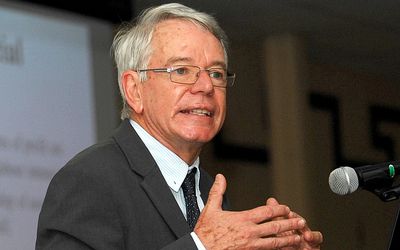Groups peddling land bill panic
by Ronald Wesso
2016-06-30 05:49:37.0
PARLIAMENT recently passed the Expropriation Bill, which now only needs the signature of President Jacob Zuma to become law. Does this mean there will soon be big changes in the way land reform takes place in SA? Or is this just an example of the politics of false promises and false alarms of radical change?
Werksmans Attorneys director Bulelwa Mabasa explained in a recent article why it is very unlikely that land reform will change significantly as a result of this change in law. The bill does not introduce anything new to South African law nor does it take away existing property rights.
Expropriation has been embedded in law since at least 1975, and the formula for compensation in the current bill is no different from the one in the Constitution since 1996. The bill does not take away compensation or the involvement of the courts in determining it. All it does is bring the Expropriation Act in line with the Constitution.
Up to now the ANC has chosen to use a willing buyer, willing seller approach to land reform. It has chosen to not make expropriation a central part of its land reform strategy. And it has chosen to compensate landowners at so-called market value instead of using the formula for compensation suggested by the Constitution.
Will it choose differently now? Mabasa lists three reasons why this is highly unlikely.
First, although the bill’s formula will lower the cost of compensation, land reform will still cost a lot of money. But no extra funds have been allocated by the government in the budget.
Second, the reopening of the lodging of restitution claims will further clog an overloaded process that has to date not settled many claims lodged in the 1990s.
Third, the government is under pressure to appease investors and ratings agencies, which means staying away from radical wealth redistribution. This means the legal content and the political context of the bill make it highly unlikely it will shift the land reform programme in a radical direction.
It is, however, true that a sense that big changes are coming has been created by a combination of the actions and statements of the ANC as the government, the Institute of Race Relations (IRR), the Freedom Front Plus, the DA, organised agribusiness in the form of AgriSA, and most mainstream media outlets. Understanding the politics behind this manufacturing of perceptions of change is perhaps as important as understanding the content of the bill.
The ANC’s interest in spreading this lie of a revolution around the-corner should be obvious. The party is under pressure, facing intensifying protests and resistance, and the Marikana massacre was a big blow to its credibility among working-class blacks.
The ANC needs black people to hope and believe that the party is about to address the apartheid inequalities that its neoliberal capitalist approach after 1994 has deepened in some ways.
What, though, are the agendas of the IRR and others? An exchange between the institute and Jeremy Cronin, deputy minister of public works and deputy general secretary of the South African Communist Party, illustrates one of these agendas.
The IRR came out strongly against the bill, arguing that it is unconstitutional, undermines property rights, gives new arbitrary powers to state institutions, chases away investors and removes the courts from determining the amount of compensation.
From the tone of the IRR’s statements, one gets the impression they believe the ANC is turning away from its neoliberal capitalist approach in favour of a revolutionary socialist direction.
Cronin was deeply annoyed by this. He responded by pointing out that none of this is true and that the bill was fully consistent with the Constitution’s so-called property clause (section 25), which guarantees property rights and compensation. Cronin declared that he and the government remain committed to the Constitution.
The IRR is probably sincere in its panic about impending radical change. But the sum of their actions has the same effect as a trick that was allegedly perfected by some intelligence agencies. When they worried that a government was doing something they did not want, but the agency lacked information, they would plant a story in the media that alleged the government in question was doing the very thing the agency did not want. The targeted government would duly issue a denial and the agents would study its tone and content to help them determine whether the threat was real.
Groups like the IRR similarly play the role of putting the ANC government on the defensive at the slightest sign they might go outside a neoliberal framework. As a result, we see a communist declare his everlasting love for the country’s liberal Constitution.
One can understand Cronin’s irritation. The ANC has been managing neoliberal capitalism for 20 years, and it needs the support of the black working class to do so; or it at least needs to be able to neutralise resistance to some degree.
Sometimes it has to do things to gain that support and effect the neutralisation — whether it is false promises like the bill or real concessions like minimum wages. Then along come these neoliberal think-tanks and force the ANC to expose their own manoeuvre.
The broader lesson is that radical land reform will be opposed by the state. Those who want it should focus on strengthening the self-organised movements of landless people who have been doing land occupations in defiance of the state for the past 20 years.
Of course, these occupations contain a threat to the property rights embedded in the Constitution and the entire system of neoliberal capitalism that rests on it. That goes to show that people like Cronin who talk revolution but actually fear it are an obstacle to radical land reform.
• Wesso is research and policy lead at Oxfam SA

Jeremy Cronin. Picture: PUXLEY MAKGATHO
PARLIAMENT recently passed the Expropriation Bill, which now only needs the signature of President Jacob Zuma to become law. Does this mean there will soon be big changes in the way land reform takes place in SA? Or is this just an example of the politics of false promises and false alarms of radical change?
Werksmans Attorneys director Bulelwa Mabasa explained in a recent article why it is very unlikely that land reform will change significantly as a result of this change in law. The bill does not introduce anything new to South African law nor does it take away existing property rights.
Expropriation has been embedded in law since at least 1975, and the formula for compensation in the current bill is no different from the one in the Constitution since 1996. The bill does not take away compensation or the involvement of the courts in determining it. All it does is bring the Expropriation Act in line with the Constitution.
Up to now the ANC has chosen to use a willing buyer, willing seller approach to land reform. It has chosen to not make expropriation a central part of its land reform strategy. And it has chosen to compensate landowners at so-called market value instead of using the formula for compensation suggested by the Constitution.
Will it choose differently now? Mabasa lists three reasons why this is highly unlikely.
First, although the bill’s formula will lower the cost of compensation, land reform will still cost a lot of money. But no extra funds have been allocated by the government in the budget.
Second, the reopening of the lodging of restitution claims will further clog an overloaded process that has to date not settled many claims lodged in the 1990s.
Third, the government is under pressure to appease investors and ratings agencies, which means staying away from radical wealth redistribution. This means the legal content and the political context of the bill make it highly unlikely it will shift the land reform programme in a radical direction.
It is, however, true that a sense that big changes are coming has been created by a combination of the actions and statements of the ANC as the government, the Institute of Race Relations (IRR), the Freedom Front Plus, the DA, organised agribusiness in the form of AgriSA, and most mainstream media outlets. Understanding the politics behind this manufacturing of perceptions of change is perhaps as important as understanding the content of the bill.
The ANC’s interest in spreading this lie of a revolution around the-corner should be obvious. The party is under pressure, facing intensifying protests and resistance, and the Marikana massacre was a big blow to its credibility among working-class blacks.
The ANC needs black people to hope and believe that the party is about to address the apartheid inequalities that its neoliberal capitalist approach after 1994 has deepened in some ways.
What, though, are the agendas of the IRR and others? An exchange between the institute and Jeremy Cronin, deputy minister of public works and deputy general secretary of the South African Communist Party, illustrates one of these agendas.
The IRR came out strongly against the bill, arguing that it is unconstitutional, undermines property rights, gives new arbitrary powers to state institutions, chases away investors and removes the courts from determining the amount of compensation.
From the tone of the IRR’s statements, one gets the impression they believe the ANC is turning away from its neoliberal capitalist approach in favour of a revolutionary socialist direction.
Cronin was deeply annoyed by this. He responded by pointing out that none of this is true and that the bill was fully consistent with the Constitution’s so-called property clause (section 25), which guarantees property rights and compensation. Cronin declared that he and the government remain committed to the Constitution.
The IRR is probably sincere in its panic about impending radical change. But the sum of their actions has the same effect as a trick that was allegedly perfected by some intelligence agencies. When they worried that a government was doing something they did not want, but the agency lacked information, they would plant a story in the media that alleged the government in question was doing the very thing the agency did not want. The targeted government would duly issue a denial and the agents would study its tone and content to help them determine whether the threat was real.
Groups like the IRR similarly play the role of putting the ANC government on the defensive at the slightest sign they might go outside a neoliberal framework. As a result, we see a communist declare his everlasting love for the country’s liberal Constitution.
One can understand Cronin’s irritation. The ANC has been managing neoliberal capitalism for 20 years, and it needs the support of the black working class to do so; or it at least needs to be able to neutralise resistance to some degree.
Sometimes it has to do things to gain that support and effect the neutralisation — whether it is false promises like the bill or real concessions like minimum wages. Then along come these neoliberal think-tanks and force the ANC to expose their own manoeuvre.
The broader lesson is that radical land reform will be opposed by the state. Those who want it should focus on strengthening the self-organised movements of landless people who have been doing land occupations in defiance of the state for the past 20 years.
Of course, these occupations contain a threat to the property rights embedded in the Constitution and the entire system of neoliberal capitalism that rests on it. That goes to show that people like Cronin who talk revolution but actually fear it are an obstacle to radical land reform.
• Wesso is research and policy lead at Oxfam SA























